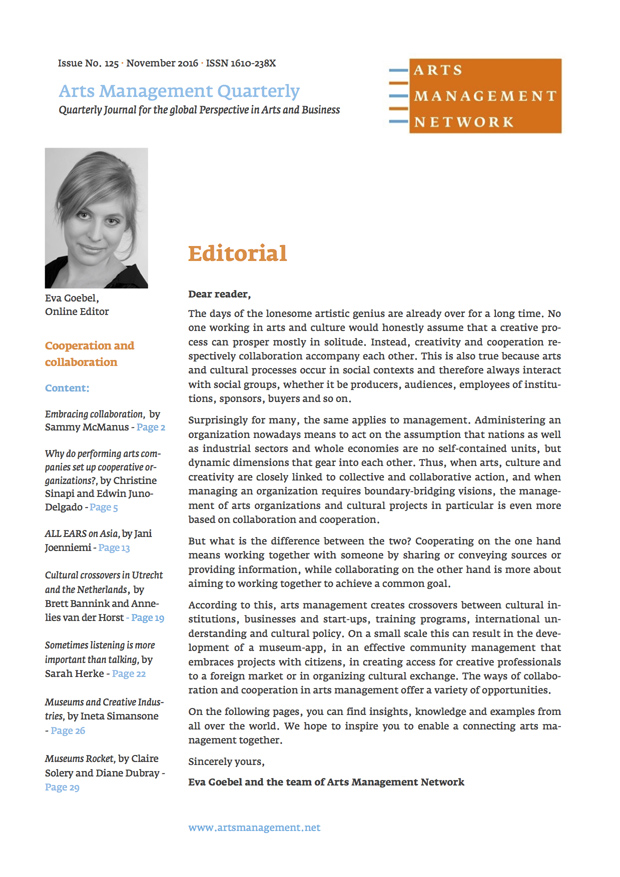Arts Management Quarterly
No 125: Cooperation and Collaboration in Arts Management

The days of the lonesome artistic genius are already over for a long time. No one working in arts and culture would honestly assume that a creative process can prosper mostly in solitude. Instead, creativity and cooperation respectively collaboration accompany each other. This is also true because arts and cultural processes occur in social contexts and therefore always interact with social groups, whether it be producers, audiences, employees of institutions, sponsors, buyers and so on. Surprisingly for many, the same applies to management. And this is what makes the current issue of Arts Management Quarterly on "cooperation and collaboration" so promising.
Administering an organization nowadays means to act on the assumption that nations as well as industrial sectors and whole economies are no self-contained units, but dynamic dimensions that gear into each other. Thus, when arts, culture and creativity are closely linked to collective and collaborative action, and when managing an organization requires boundary-bridging visions, the management of arts organizations and cultural projects in particular is even more based on collaboration and cooperation.
But what is the difference between the two? Cooperating on the one hand means working together with someone by sharing or conveying sources or providing information, while collaborating on the other hand is more about aiming at working together to achieve a common goal.
According to this, arts management creates crossovers between cultural in- stitutions, businesses and start-ups, training programs, international understanding and cultural policy. On a small scale this can result in the development of a museum-app, in an effective community management that embraces projects with citizens, in creating access for creative professionals to a foreign market or in organizing cultural exchange. The ways of collaboration and cooperation in arts management offer a variety of opportunities.
In the current issue of Arts Management Quarterly, you can find insights, knowledge and examples from all over the world. We hope to inspire you to enable a connecting arts management together.
Table of Contents
SPECIAL FOCUS - Cooperation and collaboration
- Embracing collaboration, by Sammy McManus
- Why do performing arts companies set up cooperative organizations, and why does it matter?, by Christine Sinapi and Edwin Juno-Delago
- All EARS on Asia, by Jani Joenniemi
- Cultural crossovers in Utrecht and the Netherlands, by Annelies van der Horst and Brett Bannink
- Sometimes listening is more important than talking. From cooperation to collaboration, by Sarah Herke
- Museums and Creative Industries. A joint venture for shaping access to culture, by Ineta Simansone
- Museum Rocket. Making a case for collaborations between young entrepreneurs and museums, by Claire Solery and Diane Drubay
About Arts Management Quarterly
Are you interested in succeeding in the international arts sector? Then you need a comprehensive overview of new developments and the necessary know-how for their implementation. Arts Management Quarterly is an established digital journal aimed at the international audience. Not only does it reflect major developments in arts management and society beyond the national context, it also sheds light on regional developments and approaches that can be inspiring for the international arts sector.
Arts Management Quarterly can be obtained free of charge by email if you subscribe here:
In each issue, the journal focuses on a central topic from different perspectives to assess it in its entirety for the international arts sector. The journal also includes the series “Recommended Reading“ and “My working world“.
Arts Management Quarterly is published under a CC BY-NC-ND 4.0 license.
Find out how you can become an author of Arts Management Quarterly and give our readers insights into your work:
Previous issues can be downloaded in the archive:
There are no comments for this content yet.
similar content
No 922024-04-16

